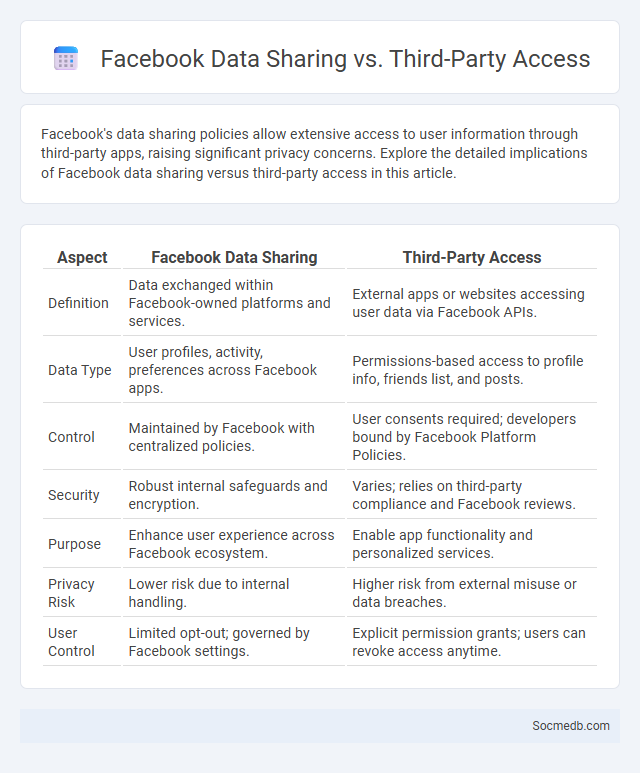
Photo illustration: Facebook Data Sharing vs Third-Party Access
Facebook's data sharing policies allow extensive access to user information through third-party apps, raising significant privacy concerns. Explore the detailed implications of Facebook data sharing versus third-party access in this article.
Table of Comparison
| Aspect | Facebook Data Sharing | Third-Party Access |
|---|---|---|
| Definition | Data exchanged within Facebook-owned platforms and services. | External apps or websites accessing user data via Facebook APIs. |
| Data Type | User profiles, activity, preferences across Facebook apps. | Permissions-based access to profile info, friends list, and posts. |
| Control | Maintained by Facebook with centralized policies. | User consents required; developers bound by Facebook Platform Policies. |
| Security | Robust internal safeguards and encryption. | Varies; relies on third-party compliance and Facebook reviews. |
| Purpose | Enhance user experience across Facebook ecosystem. | Enable app functionality and personalized services. |
| Privacy Risk | Lower risk due to internal handling. | Higher risk from external misuse or data breaches. |
| User Control | Limited opt-out; governed by Facebook settings. | Explicit permission grants; users can revoke access anytime. |
Introduction to Facebook Data Sharing
Facebook data sharing involves the distribution of users' personal information with third-party apps, advertisers, and business partners to enhance targeted advertising and improve user experience. The platform collects extensive data, including user interactions, preferences, location, and demographic details, which are then analyzed to optimize content delivery and engage audiences effectively. Understanding Facebook's data-sharing policies and privacy controls is crucial for users to manage their digital footprint and protect sensitive information.
Understanding Third-Party Access on Facebook
Understanding third-party access on Facebook is crucial to protect your personal data from unauthorized use. Facebook allows external apps and websites to access your profile information, activity, and friend lists based on granted permissions. Regularly reviewing and managing these third-party app permissions ensures that your private information remains secure and reduces potential risks of data misuse.
What Are Third-Party Apps on Facebook?
Third-party apps on Facebook are external applications developed by companies or individuals that integrate with your Facebook account to provide additional features or services, such as games, quizzes, or productivity tools. These apps can access certain personal information and interact with your social media profile based on the permissions you grant, making it essential to review and manage app permissions regularly to protect your privacy. You can control which third-party apps have access to your data through Facebook's settings, ensuring a secure and customized social media experience.
Facebook Data Sharing: Purpose and Process
Facebook data sharing primarily serves to enhance user experience by personalizing content and improving ad targeting through collaboration with trusted third-party partners. Your data is collected via interactions such as likes, shares, and clicks, then securely transmitted following strict privacy protocols to ensure compliance with regulations like GDPR. This process enables Facebook to optimize platform functionality while maintaining transparency about how your information is utilized.
How Third-Party Access Differs from Data Sharing
Third-party access refers to external apps or services connecting directly to your social media accounts to retrieve or use your data, often requiring your explicit permission. Data sharing involves the exchange of user information between social media platforms and other organizations, typically governed by privacy policies and user consent settings. Understanding this distinction helps you control how your personal information is accessed and managed across digital ecosystems.
Third-Party Apps: Permissions and Privacy Risks
Third-party apps connected to social media platforms often request extensive permissions that can expose users to significant privacy risks. These permissions may include access to personal data, contact lists, and location information, increasing the potential for data misuse or unauthorized sharing. Users should carefully review app permissions and privacy policies to mitigate risks associated with third-party integrations on social media networks.
User Consent: Data Sharing vs App Access
User consent is crucial in social media platforms when distinguishing between data sharing and app access, ensuring transparency on how your personal information is utilized. Data sharing involves permission to distribute your information across third parties for targeted advertising or analytics, while app access pertains to the permissions granted to an application to interact with your profile or device functionalities. Understanding these distinctions empowers you to control your privacy settings effectively and protect your digital footprint.
Facebook’s Policies on Third-Party Data Usage
Facebook's Policies on Third-Party Data Usage strictly regulate how external developers and advertisers access user data to ensure privacy and compliance with legal standards. The platform mandates transparent data collection practices, prohibits unauthorized harvesting, and requires explicit user consent for sharing personal information with third parties. Enforcement mechanisms include regular audits, penalties for violations, and ongoing updates to safeguard against misuse in alignment with evolving data protection regulations.
Protecting Your Data: Best Practices
Protecting your data on social media requires implementing strong passwords, enabling two-factor authentication, and regularly reviewing privacy settings to control who can access your information. Avoid sharing sensitive personal details and be cautious about third-party app permissions that may harvest your data. Staying informed about platform security updates and using encrypted connections help safeguard your digital footprint against unauthorized access and cyber threats.
Future Trends in Facebook Data Sharing and Third-Party Access
Future trends in Facebook data sharing emphasize enhanced user privacy controls and stricter regulations on third-party access to personal information. You can expect increased transparency in data usage policies and the implementation of advanced encryption technologies to safeguard sensitive data. This shift aims to balance personalized social media experiences with stronger protection against unauthorized data exploitation.
 socmedb.com
socmedb.com